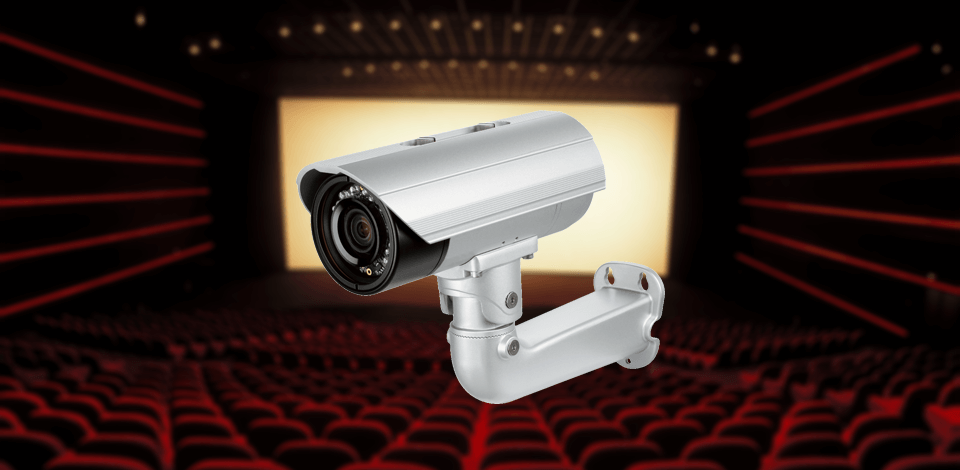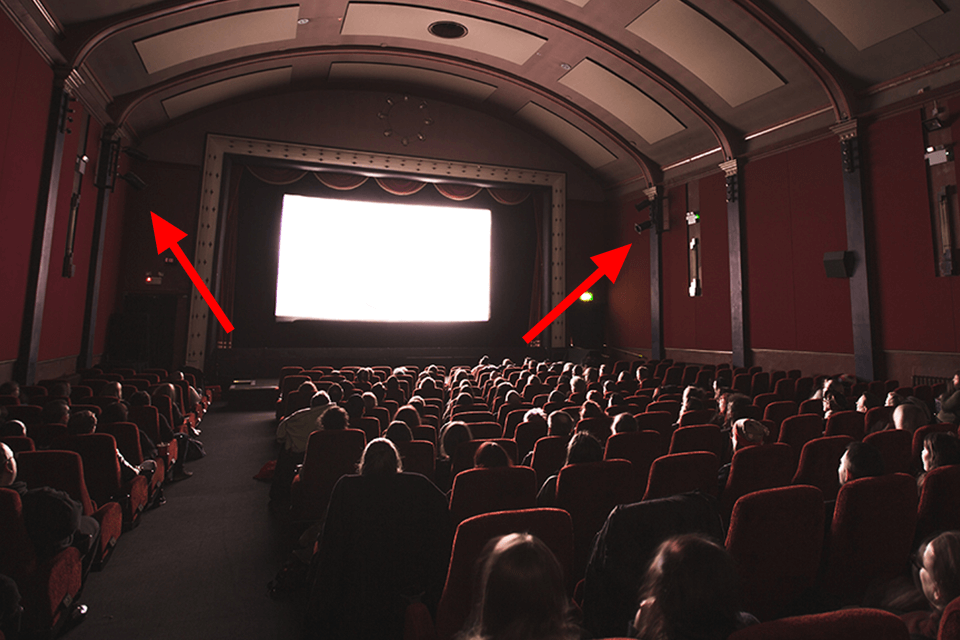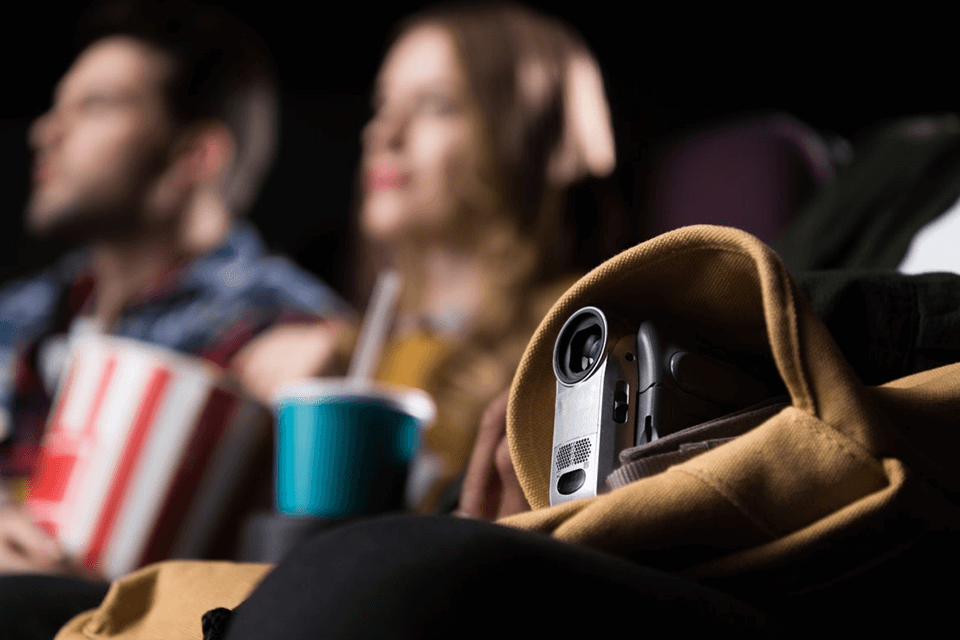
While the presence of cameras in a retail store or a bank seems logical to everyone, many people wonder do movie theaters have cameras as well, and if yes, then why?
There are multiple reasons behind such a necessity, which will be covered below.

A movie theater isn’t any different from other privately run public businesses. As such, cameras in movie theaters can be installed wherever the owners see fit as long they aren’t included in forbidden locations like bathrooms. In most cases, you’ll find body cameras in the lobby, hallway, and sometimes, even in the screening room.
Since it’s completely legal for cinemas to keep track of everything occurring on their premises, you should always assume that the answer to “Are there cameras in movie theaters?” is “Yes.”, so behave accordingly.
Note: Viewers aren’t guaranteed privacy when viewing a movie in a cinema hall.
The specific legislation related to surveillance depends on the specific country and state, but you can use this table as a general guideline that applies to most places:
| Location in Theater | Legality of Cameras | Notes |
|---|---|---|
|
Lobbies and Public Spaces |
✔️ |
They are public spaces that don’t provide any privacy. |
|
Screening Rooms |
✔️ |
This is typically allowed, particularly if targeting the viewers to prevent piracy. |
|
Bathrooms |
❌ |
Bathrooms are private premises that forbid any kind of camera surveillance. |
|
Employee-only Areas |
✔️ |
Such areas can be surveilled to prevent theft, employee malpractice, and other occurrences, but the staff must be informed about being monitored. |
|
Parking Lots |
✔️ |
Surveillance cameras in parking spaces are useful for preventing theft and vandalism while improving general safety. |
|
Box Office / Ticketing Area |
✔️ |
Such cameras can help prevent theft and solve disputes regarding ticket purchases and refunds. |

To discourage piracy. Cameras make it difficult for prospective pirates to record the movie without being apprehended.
To prevent violent outbreaks. Surveillance offers an extra layer of protection for the audience.
To prevent theft. Cameras at important locations, like the checkout or parking lot are important for discouraging such occurrences. They can also come in handy when looking for lost or stolen items as well as checking suspicious visitor behavior.
To ensure parking lot safety. When it comes to parking spaces, cameras are also useful for improving overall safety, minimizing potential risks, and recording critical footage should an accident occur.
To guarantee proper audience behavior. Cameras can be useful for making sure the moviegoers behave properly and solving quarrels by examining recorded footage.
To make sure the staff is honest. Surveillance can help ensure integrity among staff and guarantee they all follow required protocols and rules of conduct.
To record accidents. In case of a medical emergency, the existence of recorded footage can be very important. It might help understand what happened, reinforce insurance claims, or be used as evidence in legal cases.
To prevent inappropriate sexual behavior. A camera in movie theater can help prevent moviegoers from engaging in different sexual activities. This is essential for cultivating a family-appropriate environment that welcomes visitors of all ages.
Cameras are typically installed behind the audience or above the screen. On rare occasions, they can be placed in the corners of the room.
If you’re wondering if are there cameras in a movie theater you’re visiting, you can do the following:
Examine the area. The majority of security cameras are installed in a dome or bullet-shaped case. You can typically spot them in the upper corners of an area or another place near the ceiling that offers a good view.
Search for signs. Some movie theaters have signs that inform you about the inclusion of security cameras on the premises.
Employ your phone. Open the camera app and move the phone across the room. If it catches any cameras, you’ll notice a light or glare pop up on the screen.
This method is particularly useful if the camera is hidden or very small since it relies on detecting the infrared light emitted by the camera.
Yes, the majority of large chain movie theaters install surveillance cameras on their premises for all the aforementioned reasons.
The list of the biggest movie theater chains in the United States that have surveillance includes:
Generally, the pros and cons of having surveillance in a movie theater can be broken down into this table:
Even though there’s a broad range of available movie theater camera types, dome, and bullet units are the most popular ones because of how versatile they are. Such cameras are usually supplied with extra functionality like night vision, built-in zoom, and high-resolution support.
| Photo | Name | Spec |
|---|---|---|
 |
Dome cameras |
They are easy to hide and hard to tamper with. Such cameras are also reasonably cheap. |
 |
Bullet cameras |
They provide a broad field of view and can be easily mounted nearly anywhere while being offered at low prices. |
 |
PTZ cameras |
You can pan, rotate, and zoom on such a camera from a remote location, meaning your staff can cover a bigger area using just one camera. This type is more expensive than the previous two. |
 |
IP cameras |
They can transfer and receive data online, providing convenient remote monitoring and controls. |
 |
Night vision cameras |
They are supplied with infrared tech that is particularly well-suited for movie theaters. |
Yes, a lot of cinemas employ cameras of all possible kinds to monitor their premises, both in the hallway and reception areas and the screening room itself.
You can typically find cameras installed in the lobby, corridor, and screening room, with each camera serving a different security or safety goal.
In a manner of speaking, yes. Even though the staff isn’t looking at the cameras 24/7, they can review the recorded surveillance footage if needed. Such a need usually arises when investigating claims of different incidents or inappropriate behavior.
While most large chain movie theaters have CCTV surveillance, the cameras aren’t aimed at the screen but rather target the moviegoers to keep their behavior in check and prevent potential pirating.
Even though cinemas typically employ visual monitoring, it’s also possible for them to install listening devices. Their inclusion can cause valid privacy concerns, as it’s not needed to guarantee the theater’s security.
Yes, it’s common for movie theaters to install night vision cameras to keep an eye on the audience when the lighting is dimmed to ensure the movie screen is properly visible.